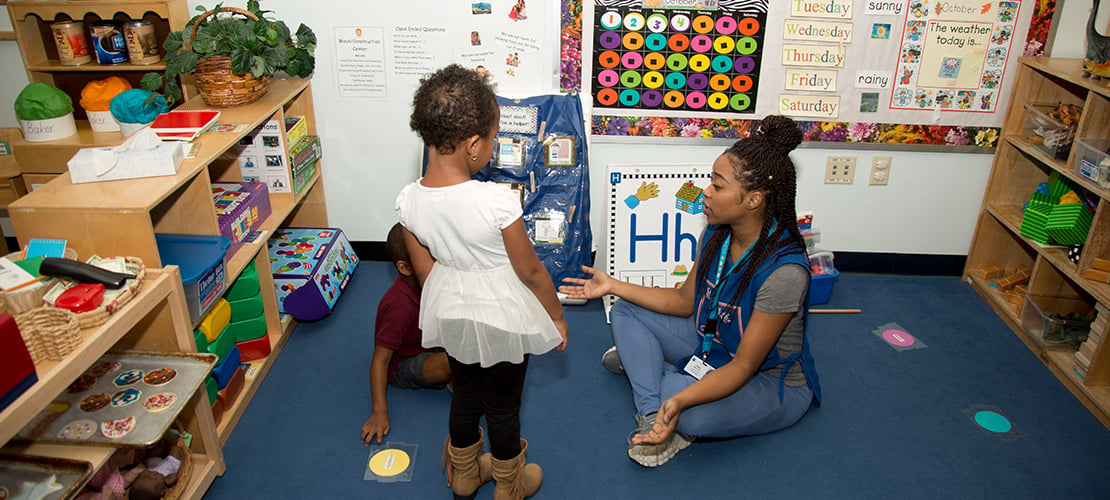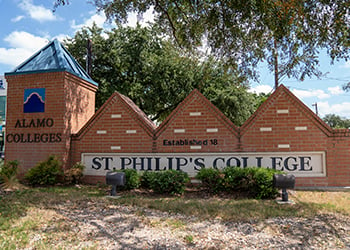
Early Childhood and Family Studies
Program Level:
Degrees, Certificates, Online
Program Type:
Face-to-Face, Fully Online
Department:
Healthcare Sciences and Early Childhood and Family Studies
Institute:
Public Service
College:
SPC
What is the Early Childhood and Family Studies program?
The Early Childhood and Family Studies Program will provide the community with a comprehensive early childhood program responsive to cultural, ethnic, and socioeconomic diversity, rich in current and innovative ideas, and nurturing authentic learning and hands-on experiences.
What will I learn?
Students will explore how children develop from birth to age 12, with a focus on birth to age 8, in all areas of development: physical, socio-emotional, language, and cognitive. The result is individuals well prepared for a variety of job opportunities in the rapidly changing early care and education profession.
What can I do with this course of study?
AAS Degree: Para-Teacher Aide, Assistant Preschool Teacher, Early Childhood Teacher, Private sector Preschool Teacher, and Child Care Director
Level II Certificate: Assistant Head Start Teacher, Assistant Child Development Specialist, Child Care Teacher, Day Care Home Provider, Family Worker/Assistant, School-age After-School Provider, Nanny
What's special about the program?
The Early Childhood and Family Studies program is offering the first online Early Childhood degree in San Antonio from an accredited college.
The Early Childhood and Family Studies Associates of Applied Science degree at St. Philip’s College is accredited by the Commission on the Accreditation of Early Childhood Higher Education Programs of the National Association for the Education of Young Children.
The current accreditation term runs from March 2019 through March 2026.
The program offers students a unique experience to complete their internship in a variety of early childhood learning environments including at an on-campus Child Development Center.
All degrees and certificates can be completed 100% online.
D. Reporting Program and Student Learning Outcomes
As part of the program’s achieving and maintaining NAEYC accreditation, it must report on the following measures and display these data via an easily located link on the program’s website. The program is strongly encouraged to use institutional resources [such as through an Institutional Research (IR) office if applicable] to assist in gathering the data on the outcome measures. Below are suggested data reporting templates, but the program is encouraged to report the data in a format that best meets its program needs. For institutions with more than one accredited program, data must be disaggregated and reported for each program.
Outcome Measure #1: The Number of Program Completers (Required)
In the chart below, please indicate the number and percentage of program completers for the three most recent academic years. Note: the percentages of the last two columns must add up to 100% for each row (Copy and paste additional charts for each program if submitting multiple programs).
| Academic Year: 2020-2021 | Program Completers: 5 | % of Full-Time Completers: 0 (0%) | % of Part-Time Completers: 5 (100%) |
| Academic Year: 2021-2022 | Program Completers: 6 | % of Full-Time Completers: 0 (0%) | % of Part-Time Completers: 6 (100%) |
| Academic Year: 2022-2023 | Program Completers: 5 | % of Full-Time Completers: 0 (0%) | % of Part-Time Completers: 5 (100%) |
4 Part-time status is defined by the institution.
Outcome Measure #2: The Program Completion Rate (Required)
What is the published timeframe for full-time candidates to complete the early childhood program(s) included in this Interim Report? (Please indicate in terms of the number of academic years; e.g., five semesters would be 2.5 academic years.):
2.5 years
In the following chart, please indicate the percentage of full-time candidates completing the program within the program's published timeframe.5 The program must complete the information for the 150% indicator and choose to report on either the 100%, 200%, or 300% indicator. The academic years selected must fall within eight years of the date this report is submitted. (Copy and paste additional charts for each program if submitting multiple programs).
Example: A program with a published timeline of two years (four semesters at 15 credits a semester) to complete an A.A.S. in Early Childhood could select a Fall 2016 cohort on which to report. The 150% indicator indicates all members of the Fall 2016 cohort (full-time at the time of enrollment) who completed the program by Spring 2019. The 100% indicator only contains members of the Fall 2016 cohort who completed the program by Spring 2018. The 200% indicator contains all members of the Fall 2016 cohort who completed the program by Spring 2020, including those already counted in the 150% indicator. Lastly, the 300% indicator contains all members of the Fall 2016 cohort who completed the program by Spring 2022, including those already counted in the 150% indicator.
Program Name: Early Childhood and Family Studies Program
| Academic year in which a Fall cohort of full-time candidates enrolled in the program (select three sequential years) | Percentage of those candidates who completed the program within 150% of the published timeframe | Percentage of those candidates who completed the program within (select one measure):
|
| 2020-2021 Fall 17 Cohort FT FTIC: 1 |
1 (100%) | 1 (100%) |
| 2021-2022 Fall 18 Cohort FT FTIC: 0 |
0 (100%) | 0 (100%) |
| 2022-2023 Fall 19 Cohort FT FTIC: 3 (1 completed a CERT2 in 2021) |
0 (0%) | 0 (0%) |
5 “The Commission defines the published time frame as the number of terms an individual candidate was enrolled in the program. The terms do not have to be consecutive, but the total number of terms must meet the program’s expected time frame for completion. University-approved withdrawals (e.g., leaves of absence for reasons of health, maternity/paternity, mission work, or military assignment) do not count toward the number of terms a candidate was enrolled in the program. Candidates taking longer due to reasons other than institution-approved withdrawals (e.g., course repeats, remediation plans) cannot be considered as meeting completion expectations.” Language adapted from the Council on Academic Accreditation for Audiology, Speech-Language Pathology of the American Speech Language Hearing Association at http://caa.asha.org/news/calculating-program-completion- rates/.
A program may (but is not required to) insert below a short narrative description (150 words maximum) of the data reflected in Outcome Measure #2 to provide context.
Outcome Measure #3: Institutional Selected Data (Required, choose one measure)
All programs are required to select at least one of the following outcome measures on which to report. (Institutions submitting multiple programs in a single Interim Report may select the same or a different measure for each program; a separate chart must be submitted for each program.)
(A) The fall-to-fall retention rate in the program for each of the three most recently completed academic years
| Academic Year | % of Part-Time Candidates Enrolled in the Program (% of Total Enrollment) | Retention Rate among Part-Time Candidates | % of Full-Time Candidates Enrolled in the Program (% of Total Enrollment) | Retention Rate among Full-Time Candidates |
| 2020-2021 | 33 (73.3%) | 15 (53.6%) | 12 (26.7%) | 4 (50%) |
| 2021-2022 | 36 (80%) | 15 (48.3%) | 9 (20%) | 6 (66.6%) |
| 2022-2023 | 33 (78.6%) | 16 (53.3%) | 9 (21.4%) | 4 (57.1%) |
OR
(B) The number and percentage of program graduates employed in the early childhood profession or pursuing further education in the profession within one year of graduation for each of the three most recent academic years for which information is available.
| Academic Year | Number of Graduates | Percentage of Graduates employed in the early childhood profession within one year of graduation* | Percentage of Graduates pursuing further education in the early childhood profession within one year of graduation* |
*The figures in these two columns do not need to add up to 100%
OR
(C) Institutionally designed measure that speaks to candidate outcomes in the program (list the measure and the data for the measure). The data must be reported for the most recent three academic years. Such measures might include the average GPA of the graduating class, the number of candidates who completed their courses with a “C” or above, the pass rate on national performance assessments such as edTPA, etc.
| Academic Year | Outcome Measure | Performance Data |
Accreditation:
The Early Childhood and Family Studies Associates of Applied Science degree at St. Philip’s College is accredited by the Commission on the Accreditation of Early Childhood Higher Education Programs of the National Association for the Education of Young Children.
The current accreditation term runs from March 2019 through March 2026.
Contact information:
1401 H. St. NW, Suite 600
Washington, D.C. 20005
Program Orientation
All students in the Early Childhood and Family Studies Program at St. Philip's College are required to participate in a program orientation at the beginning of every fall and spring semester.
Program Internship Information
The student seeking a certificate or degree in Early Childhood and Family Studies must complete an Internship to be awarded a certificate or degree. The Internship is completed in the last semester of the program. In the semester before enrolling in the Internship, students must complete the following steps: 1) Contact the Early Childhood and Family Studies Program to enroll in the course. 2) Completed drug screening. 3) Completed criminal background check, 4) Completed tuberculosis screening (within the past two years), 5.) Current CPR/First Aid Certificate.
Please Note: Candidates are required to complete all key assessments. Prior learning credit and/or credit for maintaining a current CDA credential is not approved in any course with a key assessment (TECA 1354, TECA 1303, CDEC 1323, CDEC 2315, CDEC 1359, and CDEC 2689).
Mandatory Internship Information Session
Students planning to graduate in the Fall and Spring must attend the mandatory Internship information session. The session will be announced in ECFS courses and through student advisors. Students need to RSVP to Veronica Galvan, Faculty Instructor Internship Coordinator @ 210-486-2283 or vroman6@alamo.edu.
Program Information and Orientation Sessions
The Early Childhood and Family Studies Program at St. Philip's College invites anyone interested in learning about our program to attend an upcoming orientation session to get more information. All sessions will take place in the Center for Health Professions Building at St. Philip's College. Please contact the Program Director Veronica Galvan, at 210-486-2283 or email vroman6@alamo.edu. Contact the department at 210-486-2050 if you need additional information. Check our college event calendar for Information on Session dates and times.
No person shall, on the basis of race, color, sex, pregnancy, religion, creed, national origin (including ancestry), citizenship status, physical or mental disability, age, marital status, sexual orientation, gender, transgender status, gender identity, gender expression, veteran or military status (including special disabled veteran, Vietnam-era veteran, or recently separated veteran), predisposing genetic characteristics, domestic violence victim status, any other protected category under applicable local, state or federal law, or persons who have opposed discrimination or participated in any complaint process on campus or before a government agency, be excluded from participation in, denied the benefits of, or subjected to discrimination in employment or under any program or activity sponsored or conducted by the College District. H.1.1
Application Process:
Students interested in admission into the Early Childhood and Family Studies Program at St. Philip's College are required to submit a program application.
All students accepted into the program will begin in the Fall semester of each academic year.
The application packet should include the following as PDF documents:
- Completed application form in PDF format
- Copy of any certifications earned (e.g. Child Development Associate)
- Typed letter of interest - Submit letter in PDF format
Application Deadlines
Fall semester (Flex and 16-week sessions) August 1
The application packet must be submitted via email with a Subject: Name, Application, and Letter of Interest.
Email to Veronica Galvan, Program Director, vroman6@alamo.edu
Program Information:
Department of Healthcare Science & Early Childhood-St. Philip's College
Early Childhood and Family Studies Program
1801 Martin Luther King Drive
San Antonio, Texas, 78203
|
Course |
Course Title |
AAS/Level 2 |
|
CDEC 1319 |
Child Guidance |
AAS & Level 2 |
|
TECA 1311 |
Educating Young Children |
AAS & Level 2 |
|
CDEC 1313 |
Curriculum Resources |
AAS & Level 2 |
|
CDEC 2304 |
Child Abuse & Neglect |
AAS & Level 2 |
|
CDEC 1321 |
The Infant and Toddler |
AAS only |
|
CDEC 2307 |
Math and Science for Early Childhood |
AAS only |
Information Sessions
|
Virtual |
1/29/2025 |
4:00 PM - 5:00 PM |
Zoom ID: 210 486 2049 |
|
Virtual |
2/5/2025 |
4:00 PM - 5:00 PM |
Zoom ID: 210 486 2049 |
|
Virtual |
2/12/2025 |
4:00 PM - 5:00 PM |
Zoom ID: 210 486 2049 |
|
Virtual |
2/19/2025 |
4:00 PM - 5:00 PM |
Zoom ID: 210 486 2049 |
|
Virtual |
2/26/2025 |
4:00 PM - 5:00 PM |
Zoom ID: 210 486 2049 |
Degrees and Certificates
St. Philip's College programs offer the following degree(s) and certificate(s). View our Course Catalog for more information.
- Early Childhood and Family Studies, A.A.S.♦︎
- Early Childhood and Family Studies Level 2 Certificate♦︎
♦ This symbol indicates the offering is also available fully online.

Contact Us
|
Veronica Galvan, BA, MEd. Program Director |
MLK : Center for Health Professions (CHP), 202B |
|
|
Christine Sauceda, M.S. Certified Advisor |
MLK : Welcome Center (WEC) |




